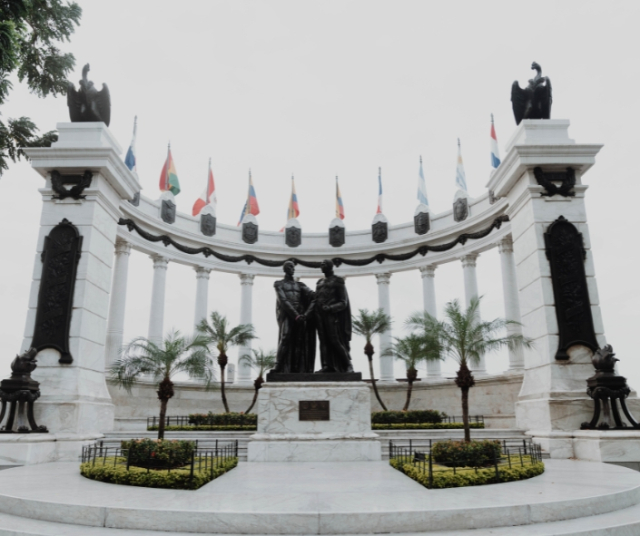December 17 marks the anniversary of the death of the illustrious South American leader, the Liberator Simón Bolívar, in the coastal city of Santa Marta, Colombia. Although his life ended in Colombian lands, Bolívar's impact extends throughout Latin America, including Ecuador, where his mark is indelible. In this article, we will explore the life, legacy and commemoration of Simón Bolívar in Ecuador on the anniversary of his death.
The Life of a Visionary
Simón Bolívar, born on July 24, 1783 in Caracas, Captaincy General of Venezuela, was a central figure in the fight for independence in Latin America. Known as The Liberator, Bolívar played a crucial role in the liberation of several South American countries from Spanish rule. His vision of a united Latin America free from colonial oppression resonated deeply in the hearts of those who yearned for self-determination.
Bolívar and Ecuador: An Indissoluble Link.
The Liberation Campaign:
Bolívar played a key role in the independence of Ecuador. During the Liberating Campaign, a series of battles that sought to liberate Quito, Guayaquil, and other Ecuadorian cities, Bolívar led insurgent forces in their fight against Spanish rule. The Battle of Pichincha, on May 24, 1822, marked a crucial milestone in Ecuadorian independence, consolidating the victory under the leadership of Bolívar.
The Great Colombia:
Bolívar dreamed of the union of the liberated countries in a federation known as Gran Colombia, which included territories of what are today Colombia, Venezuela, Ecuador and Panama. Ecuador became part of this federation in 1822, and Bolívar worked tirelessly to consolidate the union, although his efforts were hampered by political tensions and ideological differences.
The Death of the Liberator and its Impact on Ecuador.
The Last Sigh in Santa Marta:
On December 17, 1830, Simón Bolívar died in Santa Marta, Colombia, at the age of 47. His death left an immense void in the region and led to the dissolution of Gran Colombia. Ecuador, like other liberated nations, found itself in a period of redefinition and search for identity after the departure of the leader who had guided its fight for independence.
Mourning in Ecuador:
The news of Bolívar's death generated deep mourning in Ecuador. The country had shared crucial moments with the Liberator, from the Battle of Pichincha to the attempts to consolidate Gran Colombia. The news resonated in the streets of Quito, Guayaquil and other cities, where people expressed their regret and recognition of the leader who had contributed significantly to the liberation of the country.
Anniversary Commemoration in Ecuador.
Liberator's Day:
December 17 is commemorated in Ecuador as Liberator's Day in honor of Simón Bolívar. This date is an annual reminder of his legacy and contribution to the independence of Ecuador and other South American countries. Schools, government institutions, and civic organizations often hold events and ceremonies to remember the figure of Bolívar and his lasting impact.
Ceremonial Acts:
In cities like Quito and Guayaquil, ceremonial events are held to pay tribute to the Liberator. These events may include speeches, laying wreaths at monuments dedicated to Bolívar, and parades highlighting history and the fight for independence. The city of Guayaquil, which played a vital role in independence, is often the scene of notable celebrations.
Floral Offerings:
A tradition rooted in these commemorations is the placement of floral offerings on the monuments and statues dedicated to Simón Bolívar. Government officials, representatives of the armed forces, community leaders and ordinary citizens come together to express their respect and admiration by presenting flowers, symbolizing the freshness of Bolívar's memory.
Patriotic Parades:
Guayaquil, known as the "Pearl of the Pacific" and the birthplace of important independence events, hosts patriotic parades in which students, civic organizations and cultural groups participate. These parades, full of color and patriotic fervor, travel through the main streets, remembering the heroic deed that culminated in the independence of Ecuador and other South American countries.
Cultural events:
The commemoration of the anniversary of Bolívar's death in Ecuador is not only limited to formal events, but also embraces cultural expressions. Theatrical presentations, poetry recitals, and musical events dedicated to highlighting the era and figure of the Liberator are an integral part of the celebrations. These events seek not only to educate, but also to enliven the sense of national identity.
Perpetual Legacy: Bolívar in Culture and Education.
Names of Streets and Squares:
Bolívar's legacy is present throughout Ecuador. Numerous streets, squares and avenues bear his name, reminding present and future generations of the importance of the Liberator in the history of the country.
Inclusion in Education:
The figure of Simón Bolívar is also integrated into the educational programs of Ecuador. His life, his ideals and his contribution to independence are recurring themes in the classrooms, where they seek to instill a sense of identity and patriotism based on the history of the country.
Challenges and Reflections: The Relevance of Bolívar in the 21st Century.
Political and Social Challenges:
In the 21st century, Ecuador faces complex political and social challenges. Bolívar's vision of a united Latin America under a federal government continues to be a topic of debate and reflection. Tensions between centralization and local autonomy remain present, and Bolívar's legacy is interpreted differently in the current context.
Unifier in Diversity:
Ecuador's ethnic and cultural diversity raises questions about the practical application of Bolivarian ideals today. The search for unity in diversity is a constant challenge, and the figure of Bolívar serves as a lighthouse that guides reflection on national and regional identity.
The anniversary of Simón Bolívar's death in Ecuador is more than an occasion to remember a historical leader; It is a time to reflect on the fight for freedom and the construction of a national identity. Bolívar remains an immortal figure in Ecuador's history, reminding us of the importance of independence, unity and perseverance in the pursuit of a shared future. His legacy lives on in the streets, squares and hearts of those who recognize the eternal debt they owe to El Libertador.
